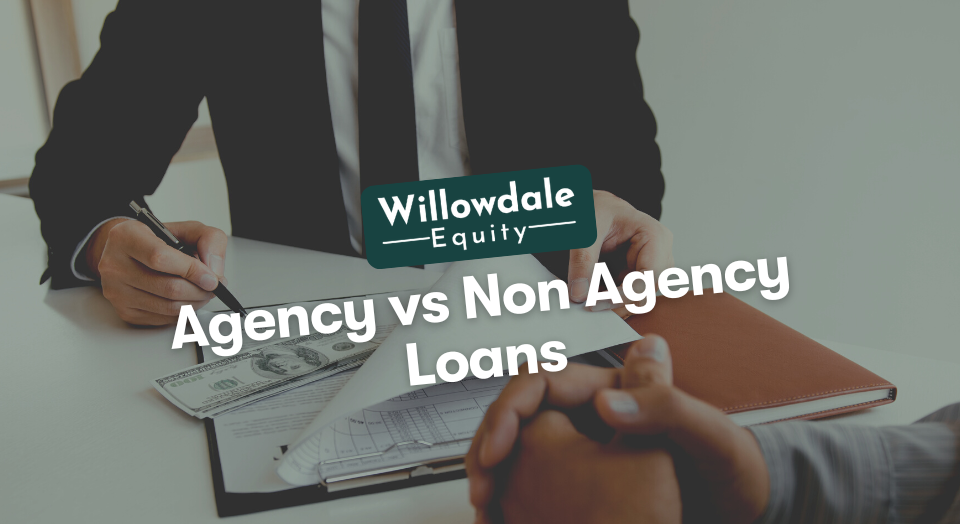An Agency Loan is a type of loan provided by a government-sponsored agency. It typically offers favorable terms.
These loans are commonly used for affordable housing projects and small businesses. Agency loans may have lower interest rates and more flexible repayment options compared to traditional bank loans. This type of financing can be advantageous for borrowers seeking cost-effective funding solutions.
Additionally, agency loans are often backed by the government, providing a level of security for both borrowers and lenders. Understanding the nuances of agency loans can help individuals and businesses make informed decisions when seeking financial support for various projects and initiatives.
Introduction To Agency Loan Strategies
Basics Of Agency Loans
Agency loans are a form of financing provided by government-sponsored enterprises (GSEs) such as Fannie Mae, Freddie Mac, and Ginnie Mae. These loans are designed to promote the availability of affordable housing and support the housing market by providing liquidity to mortgage lenders. Agency loans are typically used to finance the purchase, construction, or renovation of multifamily properties, and they offer competitive interest rates and terms.
Importance In Financial Growth
Agency loans play a crucial role in financial growth by providing access to affordable and flexible financing options for real estate investors and developers. These loans enable borrowers to acquire capital for property investments, which in turn contributes to the expansion and development of the real estate market. Additionally, agency loans help to stimulate economic growth by facilitating the construction of new residential properties and the preservation of existing affordable housing units.
Types Of Agency Loans
When considering a loan, it’s important to understand the different types available. Agency loans are a popular choice for many borrowers, offering various options to suit different needs. Let’s take a closer look at the types of agency loans available, including offerings from Fannie Mae and Freddie Mac, as well as Ginnie Mae.
Fannie Mae And Freddie Mac
Fannie Mae and Freddie Mac are government-sponsored entities that provide liquidity and stability to the housing and mortgage markets. They offer a range of loan products, including fixed-rate mortgages, adjustable-rate mortgages, and specialty products for specific borrower needs.
Ginnie Mae Offerings
Ginnie Mae, also known as the Government National Mortgage Association, focuses on helping expand affordable housing finance in America. They provide a guarantee on mortgage-backed securities that are backed by federally insured or guaranteed loans, such as FHA and VA loans, enabling lenders to offer lower interest rates to borrowers.
Comparative Analysis Of Agency Loans
Comparative Analysis of Agency Loans:
Agency Vs. Non-agency Loans
Agency loans are government-backed, while non-agency loans are not secured by the government.
Agency loans offer lower interest rates compared to non-agency loans.
Risk And Return Profiles
Agency loans have lower risk levels due to government backing, resulting in lower returns.
Non-agency loans carry higher risk but offer potential for higher returns.
Eligibility And Application Process
When it comes to securing financial assistance, agency loans can be a viable option for individuals and businesses. Understanding the eligibility criteria and application process is essential for those considering this type of funding. Here, we’ll delve into the qualification criteria and the steps to apply for an agency loan.
Qualification Criteria
The eligibility requirements for agency loans vary depending on the specific agency and the type of loan being sought. However, common qualification criteria may include:
- Credit Score: A good credit score is usually a prerequisite for agency loans.
- Income Verification: Applicants may need to provide proof of income to demonstrate their ability to repay the loan.
- Collateral: Some agency loans may require collateral to secure the funding.
- Business Plan: For business loans, a comprehensive business plan may be necessary to showcase the viability of the venture.
Steps To Apply For An Agency Loan
Applying for an agency loan typically involves the following steps:
- Research: Explore the various agency loan options available and select the one that best suits your needs.
- Gather Documentation: Collect all the necessary documents such as financial statements, tax returns, and identification.
- Complete Application: Fill out the loan application accurately and provide all requested information.
- Submit Application: Once the application is complete, submit it to the relevant agency for review.
- Review and Approval: The agency will assess your application and, if approved, provide the terms of the loan.
Strategic Benefits Of Agency Loans
When considering financing options, agency loans stand out for their strategic benefits. These loans offer lower interest rates, government backing, security, and more, making them a favorable choice for businesses seeking capital. In this article, we will delve into the strategic advantages of agency loans, shedding light on their appeal and why they are worth considering for your financing needs.
Lower Interest Rates
Agency loans are known for their competitive interest rates, which can be notably lower than those offered by traditional lenders. This can result in substantial cost savings for businesses over the life of the loan, making agency loans an attractive financing option.
Government Backing And Security
One of the strategic benefits of agency loans is the government backing they carry. These loans are typically guaranteed by government-sponsored entities, providing a level of security for both borrowers and lenders. This government support instills confidence and stability in the lending process, making agency loans a reliable choice for businesses seeking funding.

Credit: willowdaleequity.com
Case Studies
Exploring Agency Loan case studies provides valuable insights into successful implementations and lessons learned in the financial sector.
Success Stories
Agency Loan success stories highlight the positive impact of well-executed financial strategies.
Lessons Learned
Reflecting on Agency Loan case studies reveals important lessons that can be applied to future financial endeavors.
Challenges And Solutions
When it comes to obtaining a loan from an agency, there are common obstacles that borrowers often encounter. These challenges can hinder the loan process and impact the overall experience. However, there are effective solutions available to address these issues, ensuring a smoother and more successful loan application.
Common Obstacles
1. Strict Eligibility Criteria
Agency loans often come with stringent eligibility requirements, making it difficult for some individuals or businesses to qualify.
2. Lengthy Approval Process
The approval process for agency loans can be time-consuming, causing delays for borrowers in need of immediate financial assistance.
3. Limited Loan Options
Some agencies may offer limited loan options, restricting borrowers in terms of the amount and terms of the loan.
Effective Solutions
1. Strengthening Financial Profile
Borrowers can work on improving their financial profile by addressing credit issues, increasing their income, and reducing existing debt to meet the eligibility criteria.
2. Seeking Alternative Lenders
In cases where the approval process is too lengthy, borrowers can explore alternative lenders with quicker turnaround times to meet their immediate financial needs.
3. Exploring Diverse Loan Programs
Borrowers can research and explore diverse loan programs offered by different agencies to find the most suitable option for their specific financial requirements.

Credit: loan-agency.eu
Future Of Agency Loans
Agency loans have become an integral part of the financial landscape, offering flexible terms and competitive rates to borrowers. As we look ahead, it’s essential to consider the evolving trends and regulatory changes that will shape the future of agency loans.
Trends And Predictions
1. Increased Digitization: The future of agency loans will see a greater emphasis on digital processes, making it easier for borrowers to access funds and lenders to streamline their operations.
2. Enhanced Transparency: Transparency will be a key focus, with lenders providing clearer terms and conditions, empowering borrowers to make informed decisions.
3. Growing Sustainability: Sustainable financing options will gain traction, aligning with the global shift towards environmentally conscious practices.
Impact Of Regulatory Changes
The evolving regulatory landscape will have a profound impact on agency loans, influencing the terms, accessibility, and overall dynamics of these financial products.
1. Stricter Compliance Requirements: Regulatory changes will necessitate enhanced compliance measures, ensuring that agency loans meet stringent standards for consumer protection.
2. Altered Risk Assessment: Regulatory updates may lead to a reevaluation of risk assessment methodologies, potentially affecting the availability and terms of agency loans.

Credit: www.nchfa.com
Frequently Asked Questions
What Is An Example Of An Agency Loan?
An example of an agency loan is a loan that is issued by a government agency, such as the Small Business Administration (SBA) or the Federal Housing Administration (FHA). These agencies provide loans to businesses and individuals who may not qualify for traditional bank loans.
How Do You Qualify For An Agency Loan?
To qualify for an agency loan, meet credit, income, and employment criteria set by the agency.
What Is The Difference Between Agency Loan And Non Agency Loan?
Agency loans are backed by government-sponsored entities, while non-agency loans lack this backing. The key difference lies in the level of guarantee provided, impacting risk and interest rates.
What Is Agency Lending?
Agency lending is when a financial institution lends securities on behalf of its clients. It helps investors earn additional income by lending out their assets to borrowers.
Conclusion
In essence, Agency Loans offer flexibility and convenience for borrowers. Understanding the key features and benefits can help you make informed financial decisions. By working with reputable lenders and staying informed about loan terms, you can navigate the borrowing process more effectively.
Stay informed and make the most of your loan experience.
